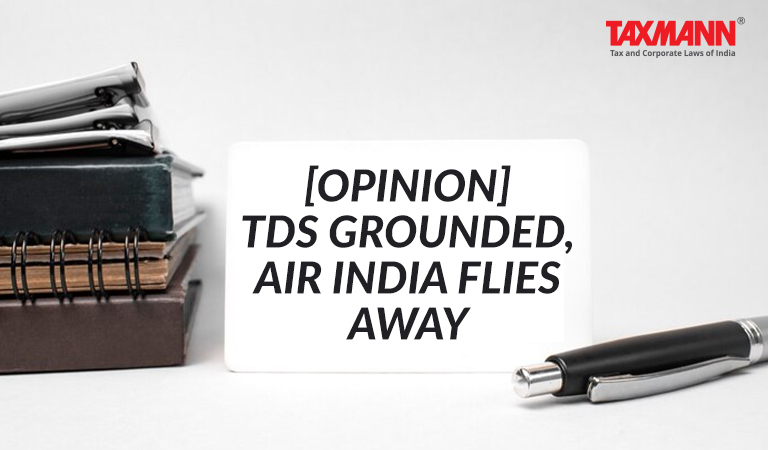[Opinion] TDS Grounded, Air India Flies Away
- Blog|News|Income Tax|
- 3 Min Read
- By Taxmann
- |
- Last Updated on 20 October, 2022

Meenakshi Subramaniam – [2022] 143 taxmann.com 231 (Article)
Once, a man lost his chessboard. He was inconsolable, as he loved the game. In every room, he searched but couldn’t find it. However, his chess partner friend, on arrival found it at once. Well, the owner was so fond of chess that he had got the floors in house designed in checkered chess board style. The chessboard was right in front, but the man couldn’t distinguish it from floor.
In same way, the beneficial first proviso to section 201(1) is tucked away in the Income Tax Act. Air India, when confronted with TDS problems, swooped on the proviso, to fly away out of big trouble.
[2022] 143 taxmann.com 52 (Mumbai – Trib.) Air India Ltd v. Commissioner of Income Tax (Appeals)
The brief facts are that the assessee company, M/s Air India Ltd is in the business of transportation of passengers and cargo by air, mail, parcel, etc. The assessee being a Public Sector Unit as national carrier owns and operate aircrafts of different types.
Air India Engineering Services Ltd (AIESL) is a wholly owned subsidiary of the assessee which is approved by DGCA for repairs and maintenance of aircraft placed in various cities, like Mumbai, Delhi, Kolkata, Chennai, Hyderabad, etc.
A survey action under section 133(2A) of the I.T. Act, 1961 was conducted in the finance department of the assessee on 13/01/2020 for the purpose of verifying compliance of TDS provisions. It was submitted that the assessee has paid Rs.8,58,12,303/- to M/s Air India Engineering Services Ltd (AIESL) for repairs/maintenance on which TDS @ 2% was made. The Assessing Officer concluded that the services were in the nature of fees for technical services which are liable for TDS @10% under section and determined Rs.68,64,984/- as shortfall of TDS alongwith interest of Rs.41,18,990/- under section 201(1A) was computed.
Aggrieved by the order, the assessee was in appeal before the Ld.CIT(A), who confirmed the order of the Assessing Officer. Further aggrieved, the assessee is in appeal before Income Tax Appellate Tribunal, against the order of the Ld.CIT(A).
These appeals have been filed by the assessee as against the order of Ld. Commissioner of Income-tax (Appeals), NFAC, Delhi pertaining to assessment years 2016-17, 2017-18, 2018-19 and 2019-20.
The grounds of appeal in all these appeals pertain to the decision of JCIT that TDS on repair and maintenance of aircraft is in the nature of technical fees and not payment of fees for works contract and wrongly applying section 194(J) instead of section 194(C) of the I.T. Act and treating the assessee to be assessee in default. Since the grounds are identical in all the appeals, the Tribunal went on to pass a consolidated order taking ITA 193/Mum/2022 as the lead case.
During the appellate proceedings, the Ld.AR for the assessee stated that the assessee was liable to deduct TDS under the provisions of section 194C instead of section 194J as, according to the assessee, the services rendered by AIESL was in the nature of ‘fees for works contract’ and not in the nature of ‘fees for technical services’ as alleged by the Ld. AO.
The Ld A.R stated that the recipient of the payment, viz., M/s AIESL has duly offered these payments as its income. Accordingly, he made an alternative submission that the benefit of proviso to sec. 201(1) may kindly be given to the assessee. He further submitted that the assessee did not claim this benefit before the AO. It could not make this claim before Ld CIT(A) also, since the assessee could not represent before Ld CIT(A). He submitted that this claim is legal claim and accordingly he prayed that this alternative contention be accepted. The Ld A.R also furnished a statement showing the details of filing of returns of income by AIESL for all the years under consideration.
The Ld D.R did not object to the alternative prayer put forth by Ld A.R.
Click Here To Read The Full Article
Disclaimer: The content/information published on the website is only for general information of the user and shall not be construed as legal advice. While the Taxmann has exercised reasonable efforts to ensure the veracity of information/content published, Taxmann shall be under no liability in any manner whatsoever for incorrect information, if any.

Taxmann Publications has a dedicated in-house Research & Editorial Team. This team consists of a team of Chartered Accountants, Company Secretaries, and Lawyers. This team works under the guidance and supervision of editor-in-chief Mr Rakesh Bhargava.
The Research and Editorial Team is responsible for developing reliable and accurate content for the readers. The team follows the six-sigma approach to achieve the benchmark of zero error in its publications and research platforms. The team ensures that the following publication guidelines are thoroughly followed while developing the content:
- The statutory material is obtained only from the authorized and reliable sources
- All the latest developments in the judicial and legislative fields are covered
- Prepare the analytical write-ups on current, controversial, and important issues to help the readers to understand the concept and its implications
- Every content published by Taxmann is complete, accurate and lucid
- All evidence-based statements are supported with proper reference to Section, Circular No., Notification No. or citations
- The golden rules of grammar, style and consistency are thoroughly followed
- Font and size that’s easy to read and remain consistent across all imprint and digital publications are applied



 CA | CS | CMA
CA | CS | CMA
